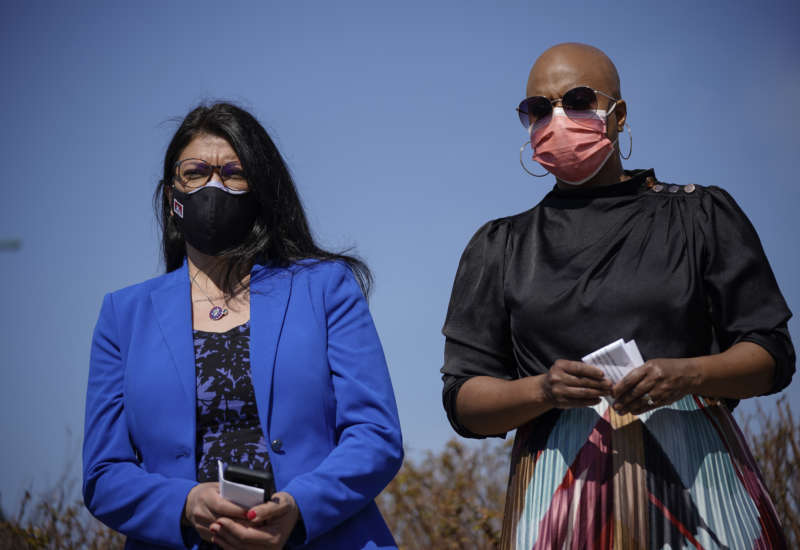On Wednesday, progressive lawmakers introduced a bill that would mandate the Federal Reserve to force large banks and financial institutions to stop funding fossil fuel projects in order to help bring the country in line with greenhouse gas emissions reductions goals.
The Fossil Free Finance Act was introduced by Representatives Rashida Tlaib (D-Michigan), Ayanna Pressley (D-Massachusetts) and Mondaire Jones (D-New York). Under the bill, the Fed would ensure that banks with more than $50 billion in assets are aligning their financing projects with emissions targets. It would prohibit financing of new or expanded fossil fuel projects after next year and prohibit financing of all fossil fuel projects after 2030.
With the goal of aligning greenhouse gas emissions with the U.S.’s commitments under the Paris Agreement, the bill also prohibits financing of greenhouse gas emissions generally, calling for a 50 percent reduction in financed emissions by 2030 and a 100 percent reduction by 2050. The banks and financial institutions would be required to report to Congress on their progress.
“Our planet is burning. Over the last five years, financial institutions under the Federal Reserve’s supervision provided trillions in direct fossil fuel financing — and each new project brings us closer to the brink,” said Tlaib. “The Federal Reserve’s role is not to surrender our planet to corporate polluters and shepherd our financial system to its destruction. The Federal Reserve’s role is to act.”
The bill is cosponsored by 14 Democrats in the House, including progressives like Rep. Alexandria Ocasio-Cortez (D-New York). It’s also been endorsed by a handful of climate organizations like Sunrise Movement, Sierra Club, 350.org and Public Citizen.
“Wall Street banks have made it clear that, without strong federal oversight and regulation, they plan to continue pouring money into the fossil fuels that are driving the climate crisis and pushing us toward another financial crisis,” said Sierra Club’s Fossil-Free Finance campaign manager Ben Cushing. “The Federal Reserve has long failed to use its existing tools to adequately rein in Wall Street’s risky fossil fuel investments.”
Fossil fuel financing has come under intense scrutiny from climate advocates over the past years. A March report found that the world’s largest 60 banks, including institutions like JP Morgan Chase, Citigroup and Wells Fargo have shelled out $3.8 trillion in financing for fossil fuel projects since the Paris Agreement was signed in 2015. The report also revealed that in spite of COVID’s impact on cutting fossil fuel use, funding has been increasing steadily over the past years.
Climate advocates draw parallels between subsidies from the government and financing from banks for fossil fuel projects, which for the most part are not even a profitable investment, and bailouts for the fossil fuel industry. Recent research suggests that fossil fuels are only dominant because of the massive bailouts provided to the industry by the government.
The Federal Reserve has been complicit in the propping up of the fossil fuel industry. Last year, under Chairman Jerome Powell, the Fed changed its lending rules so that it could accommodate the bloated, failing fossil fuel industry as COVID exposed just how fragile the industry is. Progressives have launched a campaign to oust Powell, citing his softness on Wall Street and unwillingness to address financing that exacerbates the climate crisis.
Defunding fossil fuel projects is crucial to mitigating further climate disasters, researchers and advocates say. Even traditionally conservative institutions are beginning to recognize this: the International Energy Agency (IEA) was previously hesitant to call out fossil fuel financing as a major contributor to the climate crisis, which governments and financial institutions seized on as an excuse to continue funding fossil fuel projects.
But in May, the IEA released a bombshell report saying that governments and corporations must stop pursuing new fossil fuel projects nearly immediately if the world is to set itself on track to attain net zero emissions by 2050.


